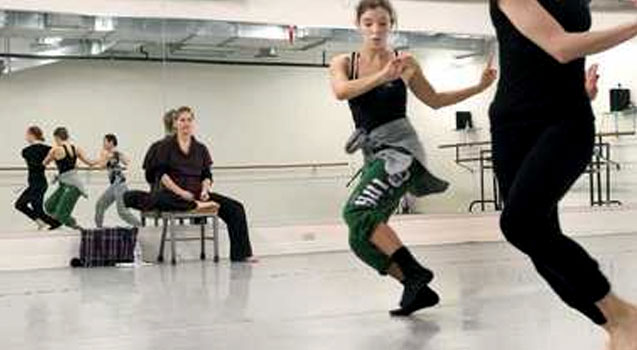Life can be a juggling act, as Kate Weare knows more than ever these days.
In addition to activity as a rising choreographer and artistic director of a New York contemporary dance company, Kate Weare Dance, she’s the busy mother of 5-month-old Lily, who travels with her mother to out-of-town performances and dance projects.
“She started touring when she was 5 weeks old, to Belgium,” says Weare, full of pep and ravenous after a rehearsal. “She’s getting used to being on the road and in many airplanes. I’m so incredibly grateful to my mother and mother-in-law
With Weare’s mother along, Lily recently spent two weeks in Northeast Ohio while her own energetic mom created a piece for GroundWorks DanceTheater, the Cleveland contemporary company run by David Shimotakahara.
The result is “Inamorata,” which will have its premiere next week at the Breen Center for the Performing Arts on a program with a new Shimotakahara work, “Luna,” and his suite “Brubeck,” created months before the death of jazz master Dave Brubeck in December.
Weare, whose works are lauded for their emotional power, crossed paths with Shimotakahara once when they were teaching classes at the North Carolina School of the Arts. But GroundWorks’ artistic director had never seen a Weare piece in the flesh when he contacted her agent about engaging her to create one for his company.
“I started researching her work online,” says Shimotakahara. “I was really taken with a piece called ‘Bright Land,’ which is all about death. There are echoes of those qualities in this new work.”
In typical Weare form, “Inamorata” is set to an array of musical selections, ranging from tango and folk music to a Bach cello suite and other styles. “I have a lot of interest in how different cultures form meaning through movement,” she says. “So much music becomes the lens through which you attach meaning. I do tend to string together different ideas. I like lots of options. I don’t like to be limited.”
Weare, 40, can trace this curiosity to her childhood in California. Both of her parents are artists “who indulged the hell out of me. Since I was very little, I was making dances.” She pursued dance in college at the California Institute of the Arts, where she focused on conceptual and theoretical training.
It wasn’t until after she graduated that she seriously pursued choreography.
“I was terribly arrogant and scared,” says Weare. “The combination of those things can be pretty toxic. I was not happy doing other people’s works. I wish it came earlier, and I had spared some people of my behavior. I needed to claim my instincts, claim my urges. I was like that as a performer, too.”
Weare danced other choreographers’ pieces until it was time to head out on her own. She founded Kate Weare Dance in 2005 in New York, where she lives with Lily and her husband, sculptor Kurt Perschke.
With her company of five dancers, Weare creates pieces, tours and holds residencies. She expects her dancers “to search and question themselves” in the same way actors explore their roles. Even more so than actors, she says, dancers make “choices through their bodies.”
Weare says her creative process differs when she’s working with her own dancers and fulfilling commissions with other companies, which usually can provide only limited rehearsal time.
What doesn’t change is Weare’s artistic vision, which is about going “where you haven’t gone,” she says. “I’m always dealing with the complexities and intensities of relationships — the way our emotional lives flux in and out very quickly on these different resonances and tempos.
“At a more basic level, we’re animals. We have these sudden, excited responses to things. If you could look underneath our surface, you’d see this vast river of emotions. I see it in my baby. I don’t think that stuff ever goes away.”
The emotions in Weare’s work are often dark. She’s intrigued by violence, menace and aggression.
“That feels potent in the dance world, because we spend so much time in our lives trying to be beautiful and graceful and acting as if the world is a peaceful place,” says Weare. “I’m searching for dancers to tell the truth in the moment.”
Shimotakahara describes the truth in Weare’s work as “a feral quality underneath that creates a lovely tension.”
Upon beginning rehearsals with GroundWorks, Weare expected to set her piece only on the company’s five dancers, not counting Shimotakahara. But as she watched the artistic director make his way through introductory phrases she was teaching, she decided to cast him in a duet with Noelle Cotler, GroundWorks’ youngest dancer.
“David has the advantage of maturity,” Weare says. “He taps into natural forces that can be acted on by the universe. I’m looking for that kind of emotional efficiency. Noelle is very charming and lovely to watch. She’s all potential. She hasn’t arrived at an artistic stance.
“That’s the arc an artist goes through of being self-aware — knowing who you are and aware of the person you are.”
By Donald Rosenberg
The Plain Dealer
February 8, 2013
Photo by Chuck Crow
The Plain Dealer


